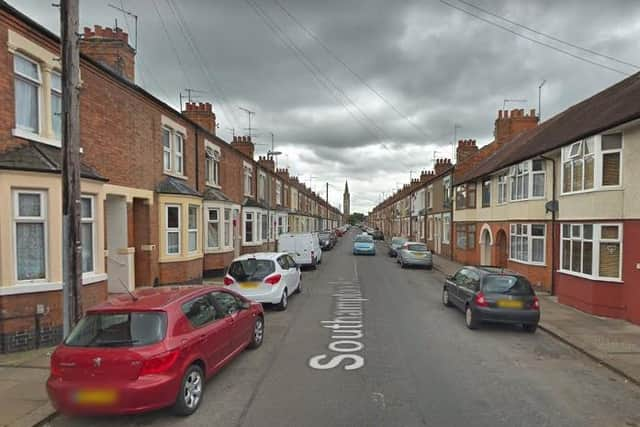Northampton HMO boom: perfect for students and low-income individuals or concerning blight on communities?
and live on Freeview channel 276
HMOs, or house in multiple occupation, have become increasingly common in Northampton, creating benefits for landlords, students and those who cannot afford to rent their own place.
But they are causing lots of concerns for residents, such as anti-social behaviour, fewer parking spaces, fly-tipping, extra rubbish and more.
Advertisement
Hide AdAdvertisement
Hide AdCan anything be done about the problem, and what do landlords have to say about the much-maligned form of housing? The Chronicle & Echo takes a closer look.


What is the problem with HMOs?
HMO refers to a property occupied by three or more unrelated individuals with rents generally based on the cost for a room rather than the house as a whole.
In towns like Northampton, where there are many streets with rows of terraced housing, there are lots of opportunities to convert properties into HMOs.
In 2016, HMO Action Group Far Cotton was set up in response to the increasing number of HMOs, partly due to the University of Northampton's new Waterside campus.


Advertisement
Hide AdAdvertisement
Hide AdGroup co-founder John Bright said: "We have issues like car parking, fly-tipping and waste not being collected but it can be down to the individual who lives at that property.
"Residents are concerned when there is an HMO application as they are worried about the impact it will have on the community."
Many of the issues relate to unregulated HMOs, rather than licenced ones, where landlords have not got permission from the council to have more people living at the property than expected.
In 2017, the now-defunct Northampton Borough Council asked the government to back its plan to stop over-development of HMOs in the town after the planning inspectorate overturned 10 rejected applications.
Advertisement
Hide AdAdvertisement
Hide AdThe borough council’s policy around HIMOs included an 'article four direction', which limited the number of HMOs to 10 per cent of housing in a 50-metre radius.
Mr Bright believes this has helped to control the issue but thinks there is not enough mixed housing stock to satisfy students and low-income individuals.
"It's about being sustainable. We are not against HIMOs but we against an over concentration of HIMOs in one area," he added.
In July this year, a petition was submitted to West Northamptonshire Council asking for the article four radius to be raised to 100 metres, as part of a new campaign against HMOs.
Advertisement
Hide AdAdvertisement
Hide AdDeputy Labour group leader at the council, Emma Roberts, thinks there should be a review of the planning policies the authority's legislative powers as they are currently not working.
"It can not carry on as it is. With the significant number of applications that are coming before the authority each committee, the authority must look at how far it is prepared to push communities who inevitably object to these applications.
"However their arguments are ignored as they don't meet required planning reasons for rejection."
What do HMO landlords think?
Richard Lee has been running Richard Lee Student Accommodation for 14 years and has nine HMOs in Northampton.
Advertisement
Hide AdAdvertisement
Hide AdHe explained that HMOs are appealing to landlords as they can get more rent than a standard buy-to-let but there are lots of legislative 'hoops' to jump through.
They are also beneficial to students and young professionals who cannot afford to, or may not want to, buy their own property and desire a social environment.
"The student market is currently saturated in Northampton for a number of reasons," he said.
"But this will normalise in the next few years and will result in many poorer properties being turned back into basic residential dwellings.
Advertisement
Hide AdAdvertisement
Hide Ad"My knowledge of other types of HMOs is limited, but colleagues have suggested that demand is high and that the problem is finding suitable tenants."
Giles Inman is the business development manager and spokesman for East Midlands Property Owners, a residential landlord association with 700 members who manage around 20,000 properties across the region.
Mr Inman believes HMOs can prevent properties remaining empty or falling into disrepair.
"Many towns and cities have large Victorian houses with small or no gardens and no dedicated parking," he said.
Advertisement
Hide AdAdvertisement
Hide Ad"These properties tend to be expensive to heat compared with other styles of family housing due to their solid wall construction and large rooms.
"These houses are also high maintenance and suffer more from disrepair than more modern family housing.
"Therefore, many of these properties without the intervention of particularly the student landlord buying and investing in them as HMOs, would remain empty, fall into disrepair, and end up blighting the communities as these empty properties would attract squatters and criminal activity."
So what can be done about HMOs?
Mr Bright thinks the council should look at working with the university to provide more purpose-built student accommodation and clamp down harder on unregulated HMOs.
Advertisement
Hide AdAdvertisement
Hide Ad"When councils are investigating whether a house is a potential HMO that needs to be licensed, then I think it needs to be more robust," he said.
"If it is not a licensed HIMO then the council needs to go and check who is living there and the living conditions.
Mr Inman believes a good working relationship between local authorities and landlords can help deal with issues.
"The HMO management regulations are in place to protect the HMO tenant and ensure the landlord provides decent and safe accommodation," he added.
Advertisement
Hide AdAdvertisement
Hide Ad"In summary there seems to be a lack of joined up thinking or joint working between councils and landlords when it comes to HMO licensing and planning.
"There is a failure by some councils to establish a good working relationship with landlords in exploring and addressing what other measures other than costly licensing and planning schemes can be implemented to deal with the problems associated with the management of HMOs."
Councillor Roberts believes the council must ensure sufficient resources are available to investigate all unregulated HMOs so it is fully aware of the status of all properties as this is crucial when density is a planning consideration.
"Labour will be looking now to the new authority, cabinet members and directors to bring the community together to ensure all avenues are investigated so that we have the best possible housing strategy that protects and benefits everyone," she added.